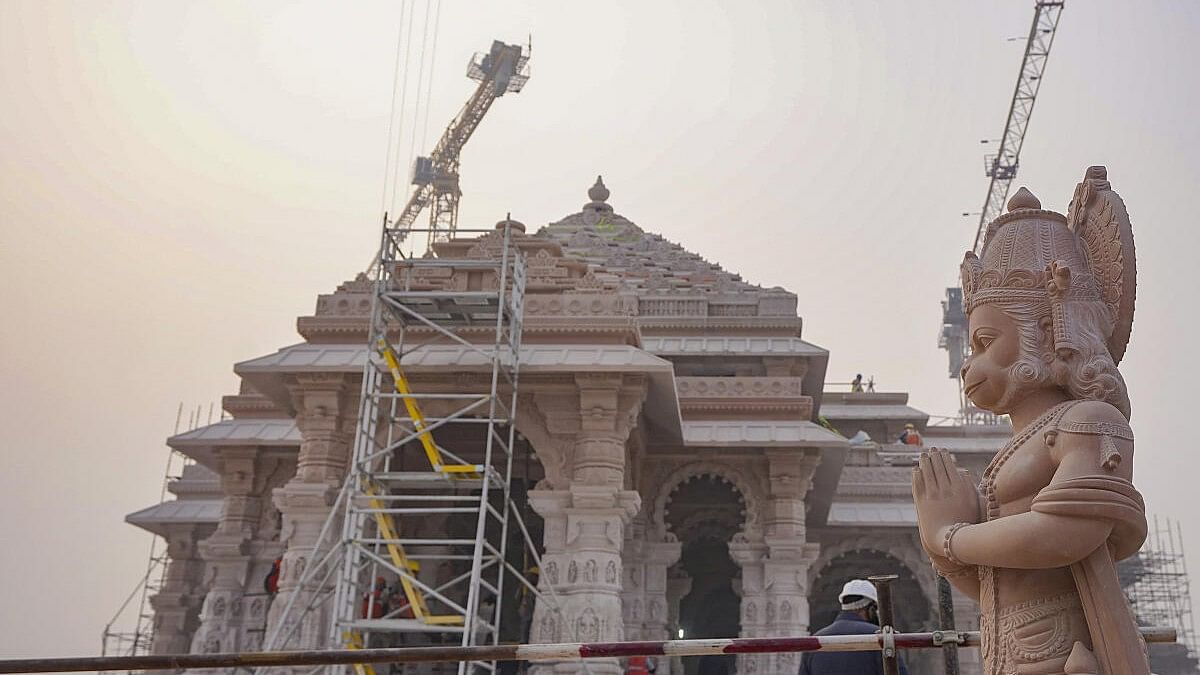
Shri Ram Janmbhoomi Temple.
Credit: PTI Photo
The Congress’ decision to skip the inauguration of the Ram mandir at Ayodhya on January 22 seems fraught with political and electoral risks. The party's bold decision might turn out to be a bad move as far as the optics are concerned, and has the potential of impacting the grand old party's poll prospects in the upcoming Lok Sabha elections.
On the Ram temple issue, the Congress has always been in a dilemma, and altered its stand from time to time. It had for some years maintained a distance from the dispute to not antagonise the Muslims. However, the Congress tried to change the perception of being a pro-Muslim party in November 2019 when it welcomed the Supreme Court verdict that paved the way for the temple construction. It went a step ahead by seeking to take credit for it, insisting that the Congress government at the Centre in 1993 had acquired 67-acre of land near the then disputed 2.77-acre site in Ayodhya. The party also claimed that it was the Rajiv Gandhi government that allowed a shilanyas (ground-breaking ceremony) for the temple at an undisputed site close to Babri masjid and opened its doors in 1986.
The apparent shift then was widely attributed to the grand old party's bid to stem the electoral slide that set in with its worst-ever drubbing in the 2014 Lok Sabha polls, and its desperate effort to be a part of the majoritarian politics.
But now the absence of top Congress leaders — Sonia Gandhi, Mallikarjun Kharge, and Adhir Ranjan Choudhary — at the January 22 event will give a fresh handle to the rival Bharatiya Janata Party (BJP), which takes pride in championing the Ram temple movement, to justify its anti-Hindu label for the grand old party.
As part of its narrative building and strategy for this year's national elections, the ruling BJP has kicked off its campaign with a focus on the mandir.
On the other hand, boycotting a very important religious event that is associated with the faith of millions of Indians is bound to prove counterproductive for the Congress unless it comes up with a better counter-narrative.
India’s oldest political party sees the invitation as a trap and argues that a religious event is being politicised by the BJP's ideological mentor, the Rashtriya Swayamsevak Sangh (RSS), to suit Prime Minister Narendra Modi's political agenda and launch his campaign for the 2024 Lok Sabha elections. The Congress claimed that the inauguration of the incomplete temple has been brought forward for electoral gains, and it does not want its top leadership to fall into any BJP/RSS trap.
Before taking a call, the Congress is said to have discussed threadbare its pros and cons and it was concluded that the core BJP voters would not be impressed by such acts, and, hence it was imperative to stick to its central ideology that there would be no compromise on secularism.
In the past, all its attempts to play a soft-Hindutva card had failed. Take for example the recent assembly elections in Madhya Pradesh and Chhattisgarh where Kamal Nath and Bhupesh Baghel of the Congress tried to lure the voters with the Hindutva card and convincingly lost the elections. In contrast, its pledge to ban the Bajrang Dal received an overwhelming response in Karnataka. The two examples indicate that religious issues cannot always be election-winning formulae.
The Congress wants to counter the BJP's strategy by raising governance issues such as unemployment and price rise. The party is hopeful that a substantial chunk of people, who consider religion a personal matter and want political parties to focus on the basic issues, will remain unaffected by the BJP frenzy over the Ram temple.
At the same time, the Congress has not barred any of its leaders from attending the consecration ceremony. Its minister from Himachal Pradesh, Vikramaditya Singh has announced that he would participate in the January 22 event.
Some of its state units too have decided to observe the consecration day. The Karnataka government has instructed the Hindu Religious and Charitable Endowments Department to arrange special prayers at all State-run temples on the day. The Uttar Pradesh Congress leaders have already stated that they would visit Ayodhya on January 15.
The Congress has justified its decisions by citing the reported stand taken by four shankaracharyas — pontiffs of major Hindu shrines or peeths situated in Joshimath in Uttarakhand, Dwarka in Gujarat, Puri in Odisha, and Sringeri in Karnataka — who have decided against attending the inauguration ceremony. The pontiffs insist that the Ram temple is still under construction and that a consecration ceremony of an incomplete mandir is not allowed as per religious scriptures.
The Congress might have decided to go against the wind on the emotive Ayodhya issue but whether it will be able to weather a possible political storm is anybody’s guess.
(Aurangzeb Naqshbandi is a senior journalist who has been covering the Congress for 15 years, and is currently associated with Pixstory.)
Disclaimer: The views expressed above are the author's own. They do not necessarily reflect the views of DH.